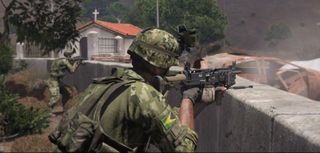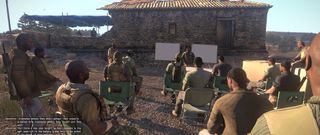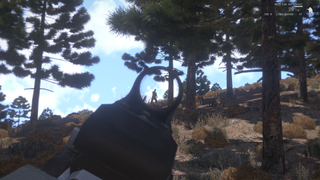This Arma 3 mod tells a better story than most FPSes

We write about FPSes each week in Triggernometry, a mixture of tips, esports, and a celebration of virtual marksmanship.
The FPS genre has produced amazing stories, as proven by successes like Portal, BioShock, or Metro 2033. It’s much more common, though, to see a pastiche of Rambo and Saving Private Ryan smeared over the top of more interesting mechanical stuff, like interesting movement, encouraging great teams, and a thriving competitive community. As Tyler dug into last week in his plan for a better Call of Duty, good storytelling is rarer than it should be, especially considering the resources behind major FPS franchises.
Still, I’m nothing if not optimistic. While reviewing the winning mods in Arma 3’s Make Arma Not War contest, I came across Deliverance and found a case study in great storytelling from an unlikely source. Plot, characters, voice acting, and cinematography in amateur mods are routinely atrocious. But Deliverance pulls it off, and it was rewarded with a third place win in the single-player category. How does Deliverance get it right?

Step 1: Take risks
Deliverance tells the story of a race war, a subject that Call of Duty wouldn’t touch from a mile away with an unmanned drone. War breaks out after an Apartheid-like law is put in place on Altis, segregating the island’s black population to the poor, undeveloped northeastern landmass.
There’s a lot of ways this could go wrong. It’s scary territory for a writer. But in making the attempt, Deliverance shows players interesting, nuanced minority characters by the dozen. The Wisecracking Black Sergeant from every war movie ever has no place here.
"Making players care about small, intimate conflicts would change the entire tenor of Call of Duty."
Part one of Deliverance follows a white member of the official Altis Army. He and his squad a well-armed, well-trained, and supported by heavy weapons and air support. As the group ventures north into segregated territory, there’s a real sense of isolation as the comforts of the racist south get farther away.
In part two, the story follows a young black mechanic who has spent his early life suffering at the hands of the white government. After being attacked in the middle of the night by white frat boys in a flashy hatchback, he flees his home and joins the insurgent black army. Though the insurgents have greater numbers, they’re armed only with ancient cast-offs and their own anger.
Step 2: Give the player space
Deliverance gives players room to make their own decisions. Even though most of the set pieces are the same as Call of Duty in form, in practice they let you do what you want to do. During one mission, I needed to cross a valley and a road to link up with my squad. I could head straight across the center, crawling to avoid detection. Or, I could curve around the west side and kill a guard. All told, I had a square mile to do anything I wanted. (I ended up off-roading it to the rendezvous.)
The biggest gaming news, reviews and hardware deals
Keep up to date with the most important stories and the best deals, as picked by the PC Gamer team.
Giving me the space to solve problems made me invested in their solutions. Once I became engaged in the plot, feeling connected to the characters around me was easy. I enjoyed the cutscenes in Deliverance, even though the animation was pretty rough. I think back to all of the times I rolled my eyes through a Battlefield cutscene because I didn’t care that Grumpy Redneck Sniper was mad at Sarcastic Nerd Corporal. I wasn’t interested because we were all sitting in a theme park ride together, and I couldn’t escape the feeling that it would go on whether I was there or not.

Step 3: Say something real about war
The central theme of Deliverance (besides the obvious: racism is bad) is the way war makes good people do bad things. Both protagonists have moments where desperation and tribalism lead them do regrettable things without pause. There are accidents and death that aren’t caused by anyone being The Bad Guys. Deliverance shows that bad things happen when you give young men war paint and guns and set them loose.
As I mentioned, last week Tyler spent some time in this space thinking about how to save Call of Duty. I submit that Deliverance and stories like it hold the key to solving that game’s image problem. Making players care about small, intimate conflicts would change the entire tenor of that series. Not having the burden of a globe-spanning, “epic” storyline makes a big difference. People die just as dead in Deliverance as they do in Call of Duty, but without the background noise of Mega America nuking Super China—or whatever—the characters can be real people telling a story about their lives. No normal human can carry that much exposition without an enhanced exo-suit, which is why it’s so easy to get lost in it. When I get lost, I stop caring.
Deliverance is one example of how freedom and risk-taking can create stories in FPSes that can’t be told in film or books. Maybe, just maybe, a huge yearly war game will take those cues to heart and use their considerable talent and monstrous budget to explore something amazing. I’m nothing if not optimistic.
Deliverance took third place in the Make Arma Not War contest, single-player mod category. You can get it on Steam.
Most Popular


